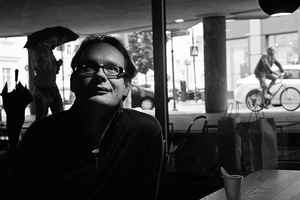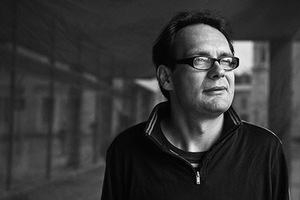A. Jakučiūnas, „It may be that literature teaches one not to read“ 7
In brief: Prose writer Andrius Jakučiūnas says, "Probably there had never been anything better said than the banality that an author should write about what is interesting and important to him. And whether his works will be interesting to others and if it matches the so-called spirit of the epoch is simply a coincidence, a fate."
I asked the author what, in his opinion, fiction is in today's world, what is its meaning. According to A. Jakučiūnas “In general, today's literature is very pragmatic (or at least is trying to be). It is ready to be as comfortable as possible, as diversified and simplified, so that no one would be exposed to any difficulties while consuming it and the author would get his dividends fast. It is no apocalypse, but young people who could actually revive literature, who understood if for what it really is, are moving away from it to places where they could get more serious tasks, at least theoretically - they choose a religious community, fight on Facebook for truth and human rights or simply vegetating. I am being a little ironic, but it does not change what I mean. We can pick up trash, save the animals and most of these things in today's world will look more prominent than literature. I do not want to sound banal - we all know it.”
I wondered what author thinks of the role of the writer in today's society. Should she/he be socially motivated and responsible? A. Jakučiūnas said: “I have always tried to make sure not to provide much space for stupidity incompetence and triviality, maybe not always tactfully, but most often sincerely. Truth is, I think I would be doing the same if I was engaged in some other activity, not necessarily writing. Stupidity and triviality is the demon of our era, sometimes it makes my head spin - how deeply idiocy is rooted in our society. A person in this society, who demands at least minimal standards of goodness and beauty and finally, truth, will be given a role of a snob or a dandy. If he calls rubbish by its true name, he will be considered cruel. And if he will express a wish for literature instead its cheap surrogate - he will be called arrogant and detached. Such thinking leads to dead end - it is death. Even if there is no truth we should respect the possibility of its existence. Just like seeking something that is very important we cannot reject the hope for miracle.”
I was interested in the writer’s opinion about the divide between high and mainstream culture, whether it is necessary and possible and what does he, personally, consider to be a good literature (book). Author says he does not know anyone who still uses this terminology, "and also do not know if today's life philosophy can afford such distinction. Now pop culture is boldly moving into elite territory and elite is becoming elegantly pop and everybody is ok with it. However, as it has always been - there is a clear divide between creative work, art and rubbish. Professional art is art; the fruits of creativity of folk, meaning each and every one of us deserves to be considered art, but the writings of our irritable little ones from the margins, who first of all are thirsty for prizes and participation in readings is not art and it has never been art. As you see, the system is pretty clear.
“You can anticipate my answer to this question based on the previous answers. If we are talking specifically about books, then I will hardly be capable of responding. Over the past few years I have worked as a reviewer of poetry and prose for the cultural press and I have read a Talmud of junk. Reading such junk you realize that the dinner prepared by the woman you love is a thousand times better literature that that. While working on that job, I was trapped in the circumstances, from which it seemed that there simply is no good literature and it cannot be.
“Another horrible experience visited me while working as ghost writer - I had the joy of re-writing one book of a starting writer. To change a bad text into an average one is a crazy and exciting task in its own way. But when you realize that in two weeks you could possibly turn that bad text into one, which in our context would be able to compete for awards, anxiety overwhelms you. Is literature only mastery? And good literature - great mastery? Many experiences of mine show that it is just like that.”


